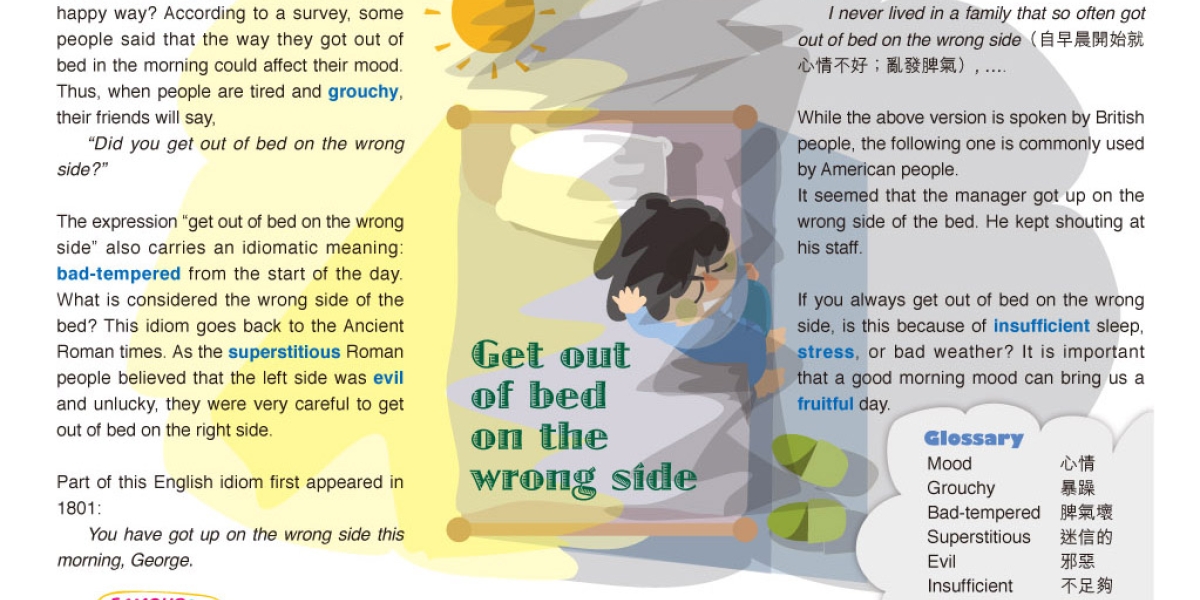昔日文章


If you were...
2018.01.27
What would you do if you were Cliff?
Cliff and Claudia are siblings(兄弟姊妹)of two years apart. They attend(參與)hip hop classes every Saturday afternoon. This past weekend the lesson was extended(延長)due to the rehearsal for a performance. They missed(錯過)the bus they usually take. Claudia was in a rush to get home so she could watch the final episode (大結局)of her favourite Korean programme. The only way was to take a cab(的士). Cli ff used up al l his allowance(零用錢)for the week already and did not want to spend on taxi fare(車錢). Claudia was in a rush and waved for a taxi without discussing the money matter with Cliff . The following Saturday, she asked Cliff to pay back the expense of the ride home.
What would you do if you were Cliff?
I’d surely refuse(拒絕)to pay back my sister because we never agreed to share the cost. It was not my need(需要), I could have waited for the next bus as I was not in a rush. Moreover(再者), I was so broke(極窮)on that day, even if she asked, I’d reject(拒絕)her. I assumed (假定)it was a free ride. If taking a cab was her only choice, she would have to do so with or without me. I would not even talk to her about the incident.
I’d explain the misunderstanding(誤會). I’d suggest that she should have asked me immediately and not drag(拖延)the issue. That would give us a chance to discuss while the memory was still fresh (記憶猶新). If she insisted(堅持)that I had to share with her because she needed money, I would lend her the amount of the fare but she would need to return(還) that to me. In future, I’d take note that clarification(澄清)comes before (重要過)action.


Stories behind famous saysings
2017.11.25
Get out of bed on the wrong side
All of us want to start our day in a good mood. What helps you begin your day in a happy way? According to a survey, some people said that the way they got out of bed in the morning could affect their mood. Thus, when people are tired and grouchy, their friends will say,
“Did you get out of bed on the wrong side?”
The expression “get out of bed on the wrong side” also carries an idiomatic meaning: bad-tempered from the start of the day. What is considered the wrong side of the bed? This idiom goes back to the Ancient Roman times. As the superstitious Roman people believed that the left side was evil and unlucky, they were very careful to get out of bed on the right side.
Part of this English idiom first appeared in 1801:
You have got up on the wrong side this morning, George.
Eventually, the current version appeared in 1887.
I never lived in a family that so often got out of bed on the wrong side(自早晨開始就心情不好;亂發脾氣), ….
While the above version is spoken by British people, the following one is commonly used by American people.
It seemed that the manager got up on the wrong side of the bed. He kept shouting at his staff.
If you always get out of bed on the wrong side, is this because of insufficient sleep, stress, or bad weather? It is important that a good morning mood can bring us a fruitful day.
Glossary
Mood
心情
Grouchy
暴躁
Bad-tempered
脾氣壞
Superstitious
迷信的
Evil
邪惡
Insufficient
不足夠
Stress
壓力
Fruitful
收穫豐富


If you were...
2017.10.21
How would you react if you were Chloe?
Chloe joined the Hong Kong Schools Speech Festival (校際朗誦節)long ago when she was in P3, it was an invitation(邀請)from the English teacher. She remembers nothing much but just the fear(恐懼) she got while she was on stage. Consequently(結果、因此), she refuses to participate(參與)in the following years. Now in S3, she thought to herself one night in bed, “If I can step on the stage again without the teacher asking me, I have already won over my fear. I am to compete with myself and not other people.”
In September, the first week after school resumed(覆課、繼續), Chloe bravely asked for an entry form(參加表格)and now she is in. Many weeks passed, nothing happens. Chloe waits and waits for someone to train her up. Now she is worrying that she will be performing badly on stage once again. The competition will commence (開始)in mid-November. Has the teacher forgotten about this matter? What are the other contestants(參賽者)doing now ? Chloe wonders(疑惑).
How would you react if you were Chloe?
Since I only want to win over my own fear, I do not need to be perfect. I will memorize(背熟)the poem by heart and just say it out on stage. After all(畢竟), I do not have to pay to join the Speech Festival, the school paid for me, what do I have to worry about? If the teacher does not proactively(主動)do something, the blame(過錯)is not on me.
I can prepare my poem by first comprehending(理解)the context(內容), finding the meaning for each vocabulary(生字、詞彙), then try to present(演繹)it in my own way and ask the teacher to give me some comments. If she has no time for me, I can ask someone who is more experienced(經驗) in this competition to give some advice.


Stories behind famous saysings
2017.09.16
Eager Beaver
Your school headteacher is planning to run a house system to enhance the sense of identity and belonging in the school. Each of you will be allocated to one of the four new houses and take part in inter-house sports and music activities and competitions. You are asked to suggest some English names for these houses. What do you think about the following name?
Eager Beaver House
The expression “eager beaver” describes someone who is tireless, diligent and works more enthusiastically than others. A beaver is an amphibious, furry animal and uses its sharp teeth skilfully to cut wood and build dams across rivers. The dams can protect beavers against predators such as wolves, bears and hawks. Since beavers are well-known as hardworking builders and spend most of the time constructing dams, there are some famous sayings like:
John is as busy as a beaver (像河貍一樣忙碌).
Mary works like a beaver (拚命工作).
Tom is a real eager beaver(工作特別賣力的人), always willing to work overtime.
While the phrase “to work like a beaver” dates back to the middle of the 18th century, the expression “eager beaver” appeared much later.
It is believed that this near-rhyming expression originated from the Canadian army during the first half of the 1900s. The beaver is Canada’s national symbol. It can be found on the Canadian five-cent coin.
Can you suggest some more house names? Remember that a good house name can enhance the spirit of loyalty and commitment to your own house.
Glossary
House 社
Identity 認同感
Belonging 歸屬感
Enthusiastically 熱心地
Amphibious 兩棲
Dams 水壩
Rhyming 押韻
Commitment 投入;承擔


